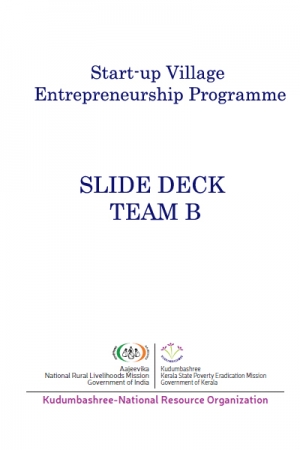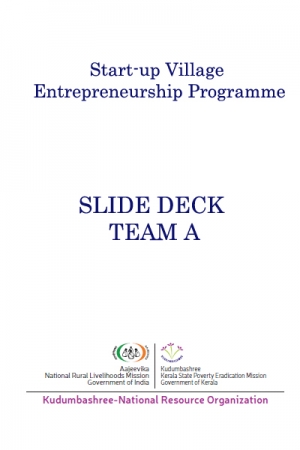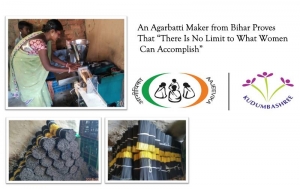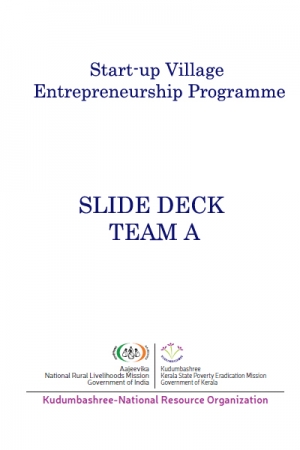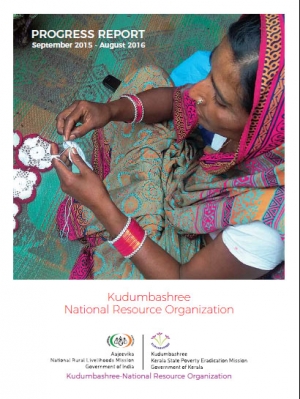Kudumbashree NRO
TEAM B, Slide Deck
TEAM A, Slide Deck
The story of an Agarbatti maker in Bihar
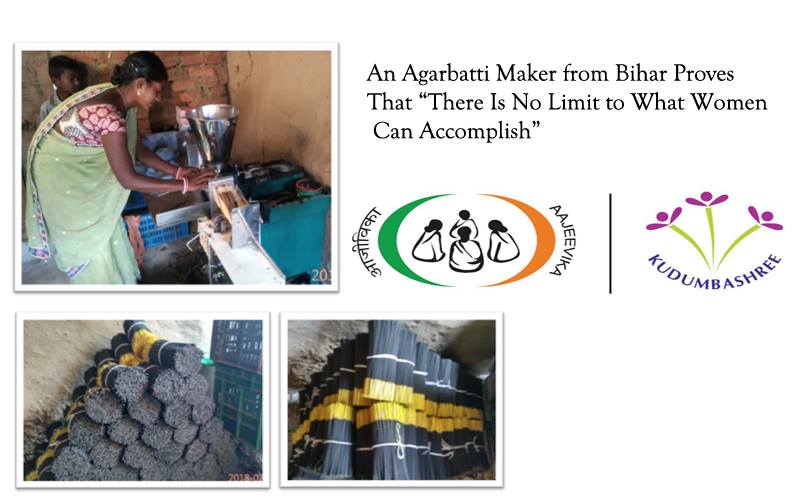
Munni Devi, is a passionate entrepreneur who has been single-handedly running an Agarbatti (Incense stick) business from a small village of Bodhgaya block in Bihar. Being illiterate and someone with no technical knowledge, her passion and zeal to run the business was rare and exceptional. As Munni Devi’s husband was unable to provide the required financial support to the family, she always wanted to earn and support the family. She believes that although she was uneducated and had never been to school, she had the ability to learn new skill very quickly.
Once during a visit to a relative’s house, she saw an incense (Agarbatti) making machine and learned to make it within a day. Since that day, she dreamt of starting the business of making Agarbattis. Her dream turned into reality when she met Sanoj Kumar, CRP-EP (Community Resource Person-Enterprise Promotion) under SVEP (Start-up Village Entrepreneurship Program) during his visit to an entrepreneurship orientation meeting in her SHG. He guided her in understanding the viability of the business and sources of funds for the starting the business.
She got a second-hand machine from the relative’s house at the cost of 1 lakh which helped her in reducing the project cost. With the help of Sanoj, she put forward her idea of starting the Agarbatti business along with a business plan with a project cost one lakh eighty-four thousand in SHG and as well as in VO meeting. As a result, CLF (Cluster level federation) of Jeevika approved to offer rupees of 1 Lakh to her to start the business. Investing remaining amount of money from her savings, she finally managed to start her Agarbatti enterprise in her home. Currently, she is making Agarbattis by procuring the necessary raw materials from nearby market and selling the product to the trader in the nearby market. She thinks that her journey has just begun and she should expand her business from production to marketing under her own brand name. She is grateful to the CRP-EP, Sanoj Kumar and people of her SHG and Cluster who supported her to start this venture.
Slide Deck- TEAM A
Project Context
The Start-up Village Entrepreneurship Program (SVEP) envisages the promotion of rural livelihoods through community-led enterprise promotion at the block-level. In a country like India, where more than 90% of the population is dependent on the unorganized sector as a means for livelihood, it is important to create an ecosystem where entrepreneurs are equipped with adequate business skills, get incubation support and are provided with necessary financial assistance. It is with this mandate, SVEP intends to support 1.82 lakh village enterprises, in 125 blocks across 24 states in a span of four years from 2015 to 2019. The program will benefit households and communities beyond financial gains by helping the rural population, especially the most marginalized, SC, ST and women to gain a sense of dignity and self-reliance.
Kudumbashree NRO has been entrusted to support 53 blocks across eight states under SVEP.
The scope of its work will include the following
▹ To help rural poor come out of poverty by helping them set up enterprises and provide support till the enterprises stabilize.
▹ To provide entrepreneurs with business skills, exposure to new ideas, financial linkages and other necessary business support.
▹ Using NRLM SHGs/federations as supporting structure during first critical six months.
▹ Identify and train 1325 CRP – EP from 53 blocks to impart requisite support to the enterprises.
▹ Creation and strengthening of about 1,27,200 village enterprises in 53 blocks across 8 states in the first phase of four years.
Major components under SVEP:
i) Community Resource Person for Enterprise Promotion (CRP-EP) – SVEP provides for a community cadre selected and trained from the SHG network (NHG in Kerala) to be deployed to provide the technical assistance to entrepreneurs in the block. The CRP-EP is conceptualised similar to the Micro Enterprise Consultants (MEC’s) who have been trained and deployed by Kudumbashree.
ii) Block Resource Centre for Enterprise Promotion (BRC) – The Block Resource Centre is a community-owned institution which is expected to be a support system for all enterprise-related activities in the block using the MEC’s.
iii) Block Level Federation (BLF) - The Block Level Federation under NRLM will be the institutional platform for BRC-EP. It will be a registered entity and will be responsible for undertaking all financial transactions related to the functioning of BRC. The Block Level Federation will own the Block Resource Centre whereas the MEC group working in the block will be assigned the responsibility of operating the BRC.
iv) Community Enterprise Fund (CEF) – The CEF is a corpus fund at the block-level that is controlled by the community for the purpose of providing loans solely for the purpose of enterprise development. Under the project a loan of up to Rs. 1 lakh can be provided for an enterprise from the CEF, but it is recommended that loans above Rs. 50,000 be first routed through banks.
Role and responsibilities of Kudumbashree NRO under SVEP
| Implementation Role | Program scale-up role |
|
(i) Implement SVEP to establish proof of concept. (ii) Ensure mid-term course correction (iii) Develop baseline, market potential study modules. (iv) Develop process for market scoping study. (v) Create a process of doing financial feasibility analysis of new enterprise. (vi) Conduct training and immersion of the PIAs. (vii) Help develop parameters for monitoring the program. (viii) Help create software for the support of the CRP-EP. |
(i) Create standardized content and training pedagogy for training of various stakeholders. (ii) Create a repository of training material and ICT material. (iii) Create a process of certification of the Mentor CRP-EPs and CRP-EPs. (iv) Support creation of a process and criteria of identification and selection of PIAs. |
Providing professional support
KS-NRO’s efforts in partner states is backed by a strong team of professionals and mentors who provide support involving multidisciplinary effort. It has selected and placed resource persons with several years of experience of working with Kudumbashree as Mentors in partner-States. Their work is coordinated by professionals selected from reputed educational institutions who provide back-end support and manage the overall activities of the state under each domain. An integrated work process comprising of monitoring, reporting and handholding system to coordinate the efforts geographically is put in place.
Sharing best practices
Kudumbashree-NRO has actively shared its good practices with other organisations since its inception. The process is facilitated by creating good practices database that connects people with information and learning mechanisms connecting people with people. Our commitment to knowledge sharing is demonstrated by the extensive exposure visits organized for various stakeholders, national workshops organised and participated in, publications it has produced for the dissemination of its concepts as well as tools and practices for a global audience.
Fostering innovations
The work carried out by Kudumbashree NRO is also influenced by the need to nurture innovations among the rural community. Many of the innovations introduced in partner states have been the direct result of its proven success in Kerala. Interventions like Balasabha- a democratic platform for children to participate in their development and GSLP- a self-learning program where women are encouraged to discuss about gender and its manifestations in their lived experiences have been implemented under convergence in states like Karnataka and Rajasthan. Whereas Beacon pilot initiatives based on successful models from Kerala like monthly markets, Café Kudumbashree and Nutrimix have been implemented in states like Maharashtra, Karnataka and Jharkhand. Such innovations strengthen the ecosystem of local community and can be an effective driving force for social and economic progress.
Improving rural livelihoods
The Enterprise promotion project focuses on improving rural livelihoods by nurturing an eco-system for encouraging entrepreneurship activities and sustaining rural micro-enterprises. Through the project, Kudumbashree NRO strives to develop strategies to increase rural entrepreneurship and promote local economic development. Rural entrepreneurship being integral to poverty reduction and sustainable livelihoods, the project envisages the establishment of a mechanism where in SHGs and their federations are made capable to drive enterprise development initiatives. It entails developing local resource pools through training and mentoring who are then equipped to provide market driven solutions to entrepreneurs.
